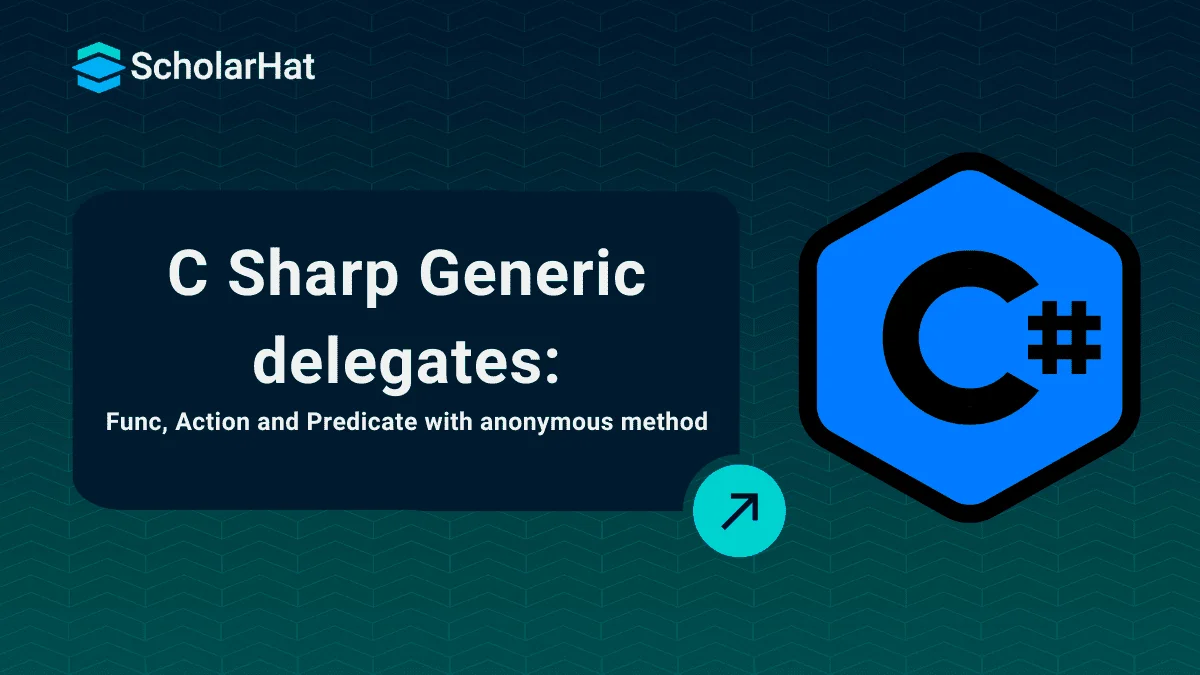15
FebC Sharp Generic delegates Func, Action and Predicate with anonymous method
Generic delegates in C#: An Overview
In .net 3.5 some new generic delegates -Func<T>, Action<T>, and Predicate<T> were introduced. Using generic delegates, it is possible to concise delegate type which means you don’t have to define the delegate statement. These delegates are the Func<T>, Action<T>, and Predicate<T> delegates and are defined in the System namespace.
In this C# Tutorial, we will explore more about generic delegates which will include generic delegates with examples, func action predicates with examples, and Generic delegates using an anonymous method. Certified C# professionals earn 20% more than non-certified peers. Get your Free C Sharp Course with Certification today!
What are the generic delegates?
- Delegates in C# are nothing but pointers to function.
- They are used for implementing events and call-back methods.
- Func, Action, and Predicate are the delegates defined in C# 3.0
- Func, Action, and Predicate are generic inbuilt delegates.
- Let's see the types of delegates with its example in C# Compiler.
1.Func Delegate in C#:
- Func is a generic delegate present in the System namespace.
- Func takes one or more input parameters and returns one out parameter and the last parameter is considered as a return value.
- It can include 0 to 16 input parameters of different types but it must have one return type.
Example:
Func delegate with two input parameters
Func func1 = DelegateClass.Add;
int value = func1(22, 44);
TParameter = 22,44;
TOutput = value = 66; Func delegate with Anonymous Methods
Func with Anonymous methods:
Func func= delegate(intx,int y){ return (x+y); };
int result = func4(2,3); 2. Action Delegate in C#
- Action present in the System namespace.
- It takes one or more than one input parameter and returns nothing.
- It does not return any value.
Example:
Action delegate with two input parameters
Action action1=DelegateClass.ShowEmploye;
action1(44,"Jayanti");
TParameter = 44,Jayanti;
TOutput = Not available (No return value) Action delegate with Anonymous Methods
Action action = delegate(String msg)
{
Console.WriteLine(msg);
};
action("Jayanti"); 3. Predicate Delegate in C#
- A predicate delegate is also an inbuilt generic delegate and is present in the System namespace.
- predicate is used to verify certain criteria of the method and returns output as Boolean, either True or False.
- The predicate can be used with the method, anonymous, and lambda expressions.
Example:
Predicate delegate with two input parameters
Predicate predicate = DelegateClass.IsNumeric;
bool number = predicate("987654");
Predicate delegate with Anonymous Methods
Predicate predicate = delegate(string str)
{
double retNum;
bool isNum = Double.TryParse(Convert.ToString(str), System.Globalization.NumberStyles.Any, System.Globalization.NumberFormatInfo.InvariantInfo, out retNum);
return isNum;
};
bool found = predicate("987654"); Generic delegates in a nutshell
Action<T> operates on the generic arguments. Func<T> performs an operation on the argument(s) and returns a value, and Predicate<T> is used to represent a set of criteria and determine if the argument matches the criteria.
delegate TResult Func ();
delegate TResult Func (T arg);
delegate TResult Func (T1 arg1, T2 arg2);
... up to T16
delegate void Action ();
delegate void Action (T arg);
delegate void Action (T1 arg1, T2 arg2);
... up to T16 Here "in" shows the input parameters and "out" shows the return value by the delegate.
Read More - C# Interview Questions For Freshers
Generic delegate example
using System;
class demo
{
delegate void MyDelegate(string str);
static void Main(string[] args)
{
MyDelegate d = show;
d("Hello World!");
Console.ReadLine();
}
static void show(string str)
{
Console.WriteLine(str);
}
}The above code can be written using a generic delegate.
using System;
class demo
{
static void Main(string[] args)
{
Action<string> d = show;
d("Hello World!");
Console.ReadLine();
}
static void show(string str)
{
Console.WriteLine(str);
}
} Generic delegate using an anonymous method
using System;
class demo
{
static void Main(string[] args)
{
Action<string> d = s => Console.WriteLine(s);
d("Hello World!");
}
} Summary
In this article, I try to explain the generic delegates with examples. I hope after reading this article you will be able to understand the use of generic delegates.
Over 10,000 companies seek certified .NET full stack developers in India. Start your journey with our full stack .NET developer course and seize top opportunities!
FAQs
Take our Csharp skill challenge to evaluate yourself!

In less than 5 minutes, with our skill challenge, you can identify your knowledge gaps and strengths in a given skill.











